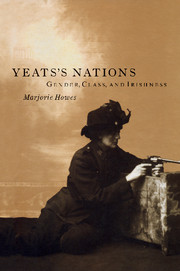Book contents
- Frontmatter
- Contents
- Acknowledgments
- List of abbreviations
- Introduction
- 1 That sweet insinuating feminine voice: hysterics, peasants, and the Celtic movement
- 2 Fair Erin as landlord: femininity and Anglo-Irish politics in The Countess Cathleen
- 3 When the mob becomes a people: nationalism and occult theatre
- 4 In the bedroom of the Big House: kindred, crisis, and Anglo-Irish nationality
- 5 Desiring women: feminine sexuality and Irish nationality in “A Woman Young and Old”
- 6 The rule of kindred: eugenics, Purgatory, and Yeats's race philosophy
- Notes
- Bibliography
- Index
1 - That sweet insinuating feminine voice: hysterics, peasants, and the Celtic movement
Published online by Cambridge University Press: 06 July 2010
- Frontmatter
- Contents
- Acknowledgments
- List of abbreviations
- Introduction
- 1 That sweet insinuating feminine voice: hysterics, peasants, and the Celtic movement
- 2 Fair Erin as landlord: femininity and Anglo-Irish politics in The Countess Cathleen
- 3 When the mob becomes a people: nationalism and occult theatre
- 4 In the bedroom of the Big House: kindred, crisis, and Anglo-Irish nationality
- 5 Desiring women: feminine sexuality and Irish nationality in “A Woman Young and Old”
- 6 The rule of kindred: eugenics, Purgatory, and Yeats's race philosophy
- Notes
- Bibliography
- Index
Summary
That Ireland, more than any other country, is spoken of as a woman is probably due to the appearance in our national affairs of qualities which men call womanly. And this impression is not merely the cheap attribution of racial inferiority by the alien critic with which we are familiar, it is our feeling about ourselves.
Horace PlunkettYou have been compelled by hags to spin
gold thread from straw and have heard men say:
“There is a feminine temperament in direct contrast to ours,
which makes her do these things. Circumscribed by a
heritage of blindness and native
incompetence, she will become wise and will be forced to give in …“
Marianne MooreFor Horace Plunkett, the impression that the Irish are womanly charts the colonized subject's debilitating internalization of an imperial stereotype. Plunkett was a pioneer of Irish agricultural reform, a unionist MP for Dublin, and, later, a Free State senator. Like Matthew Arnold, he combined an enthusiasm for the virtues of Celts with a firm unionism. His comment invokes the common confluence of race and gender in imperialist discourses that equates femininity with racial inferiority and political subordination. Plunkett assumed this equation rather than questioning it, and his masculinism was widely shared among British imperialists and Irish nationalists alike. A major strand of British imperialist discourse labelled the Irish feminine and therefore inferior, dependent and weak nationalists often disavowed femininity and asserted a compensatory and exaggerated masculinity. What is at stake, of course, is not “femininity itself,” but the ubiquity and tenacious force of the linkages between femininity, racial or national character, and colonial status.
- Type
- Chapter
- Information
- Yeats's NationsGender, Class, and Irishness, pp. 16 - 43Publisher: Cambridge University PressPrint publication year: 1996



